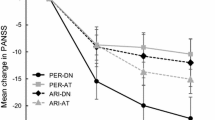Abstract
Thirty inpatients with evidence of tardive dyskinesia secondary to antipsychotic medications participated in this double-blind, controlled, randomized study comparing reserpine, α-methyldopa and placebo. Reserpine at doses of 0.75–1.5 mg daily, or α-methyldopa at doses of 750–1,500 mg daily, produced a statistically significant improvement in tardive dyskinesia symptomatology compared to the results obtained with placebo.
Similar content being viewed by others
References
Ayd EJ, Jr (1972) Treatment of persistent dyskinesia. In: Ayd FJ, Jr (ed) International drug therapy newsletter, vol 1, p 9
Baldessarini RJ (1978) Chemotherapy. In: Nicholi AM, Jr (ed) Harvard guide to modern psychiatry, vol 18. Harvard University Press, p 410
Baldessarini RJ, Kula NS, Walton KG (1979) Effects of alternative transmitter amines on cyclic AMP formation in rat brain tissue. Eur J Pharmacol 56:167–171
Ban TA (1975) Drug interactions with psychoactive drugs. Dis Nerv Syst 36:164–166
Brandrup E (1961) Tetrabenzine treatment in persisting dyskinesia caused by psychopharmaca. Am J Psychiatry 118:551–552
Carlsson A (1970) Biochemical implications of dopa-induced actions on the central nervous system with particular reference to abnormal movements. In: Barbeau A, McDowell FH (eds) L-dopa and Parkinsonism. F. A. Davis, Philadelphia, p 205
Carlsson A, Rosengren E, Bertler A, Nilsson J (1957) Effects of reserpine on the metabolism of catecholamines. In: Garattini S, Ghetti V (eds) Psychotropic drugs. Elsevier, Amsterdam
Carruthers SG (1971) Persistent tardive dyskinesia. Br Med J 3:572
Crane GE (1972) Mediocre effects of reserpine on tardive dyskinesia. N Engl J Med 288:104–105
Duvoisin RC (1972) Reserpine for tardive dyskinesia. N Engl J Med 286:611
Holzbauer M, Vogt M (1956) Depression by reserpine of the noradrenaline concentration in the hypothalamus of the cat. J Neurochem 1:8–11
Kazamatsuri H, Chien CP, Cole JO (1972a) Treatment of tardive dyskinesia. I. Clinical efficacy of a dopamine-depleting agent, tetrabenazine. Arch Gen Psychiatry 27:95–99
Kazamatsuri H, Chien CP, Cole JO (1972b) Treatment of tardive dyskinesia. II. Short-term efficacy of dopamine-blocking agents, haloperidol and thiopropazate. Arch Gen Psychiatry 27:100–103
Kazamatsuri H, Chien CP, Cole JO (1972c) Treatment of tardive dyskinesia. III. Clinical efficacy of a dopamine competing agent, methyldopa. Arch Gen Psychiatry 27:824–827
Klawans HL, Jr (1973) The pharmacology of tardive dyskinesias. Am J Psychiatry 130:82–86
Klawans H, Ilahi MM, Shenker D (1970) Theoretical implications of the use of L-dopa in parkinsonism. Acta Neurol Scand 46:409–441
Markham CH, Clark WG, Winters WD (1963) Effect of alphamethyldopa and reserpine in Huntington's chorea, Parkinson's disease and other movement disorders. Life Sci 9:697–705
Paasonen MK, Vogt M (1956) The effect of drugs on the amounts of substance P and 5-hydroxytryptamine in mammalian brain. J Physiol (Lond) 131:617–626
Pletscher A, Shore PA, Brodie BB (1955) Serotonin release as a possible mechanism of reserpine action. Science NY 122:374–375
Sato S, Daly R, Peters H (1971) Reserpine therapy of phenothiazine-induced dyskinesia. Dis Nerv Syst 32:680–685
Schmidt WR, Jarcho LW (1966) Persistent dyskinesia following phenothiazine therapy. Report of five cases and a review of the literature. Arch Neurol 14:369–377
Sourkes TL, Murphy GF, Chavez B, Zielinska M (1961) The action of some α-methyl and other amino acids on cerebral catecholamines. J Neurochem 8:109–115
Tarsy D, Baldessarini RJ (1976) The tardive dyskinesia syndrome. In: Klawans HL (ed) Clinical neuropharmacology, vol 1. Raven Press, New York, p 29
Villeneuve A, Boszormenyi Z (1970) Treatment of drug-induced dyskinesias. Lancet I:353–354
Villeneuve A, Boszormenyi Z, Deschambault M, Lachance R (1970) Tentative de traitement de la dyskinesie post-neuroleptique de type permanent. Laval Med 41:923–933
Author information
Authors and Affiliations
Rights and permissions
About this article
Cite this article
Huang, C.C., Wang, R.I.H., Hasegawa, A. et al. Reserpine and alpha-methyldopa in the treatment of tardive dyskinesia. Psychopharmacology 73, 359–362 (1981). https://doi.org/10.1007/BF00426466
Received:
Accepted:
Issue Date:
DOI: https://doi.org/10.1007/BF00426466




